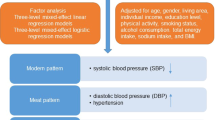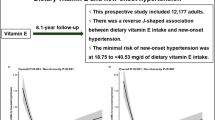Abstract
The effect of dietary antioxidants on blood pressure (BP) regulation and hypertension risk remains largely unknown. This study aimed to comprehensively assess the impacts of dietary antioxidants on systolic BP (SBP), diastolic BP (DBP), mean arterial pressure (MAP), and pulse pressure (PP), and hypertension risk among Chinese adults. The cross-sectional study assessed data from 12,046 Chinese adults, evaluating dietary antioxidant quality scores (DAQS) and total antioxidant capacity (DTAC) via a validated food frequency questionnaire. MAP was derived using the formula DBP + (0.412 ×PP), with PP calculated as SBP - DBP. The relationship between DAQS, DTAC, and hypertension prevalence was analyzed using multivariable logistic regression. Among participants not taking antihypertensive medications, those in the highest groups of DTAC and DAQS had significantly lower SBP, DBP, MAP, and PP compared to those in the lowest groups (all p-trends <0.001). Relative to the lowest quintile (Q1) of DTAC (adjusted odds ratios (OR) for hypertension decreased in Q2 (OR 0.90, 95%CI 0.79–1.03), Q3 (OR 0.65, 95% CI 0.56–0.76), Q4 (OR 0.51, 95% CI 0.43–0.60), and Q5 (OR 0.38, 95% CI 0.31–0.46) (p trend <0.001). For DQAS, hypertension OR of category 5 was 0.38 (95% CI 0.32–0.46) compared to that of category 1. Increased vitamin A, Zinc, and selenium intake correlated with reduced hypertension risk. A significant non-linear DTAC and linear DAQS relationships were observed and hypertension risk. Antioxidant-rich diets markedly lowered SBP, DBP, MAP, PP, and hypertension risk.

This is a preview of subscription content, access via your institution
Access options
Subscribe to this journal
Receive 12 print issues and online access
$259.00 per year
only $21.58 per issue
Buy this article
- Purchase on SpringerLink
- Instant access to full article PDF
Prices may be subject to local taxes which are calculated during checkout

Similar content being viewed by others
References
Collaborators 2017 Risk Factor Collaborators. Global, regional, and national comparative risk assessment of 84 behavioural, environmental and occupational, and metabolic risks or clusters of risks for 195 countries and territories, 1990-2017: a systematic analysis for the Global Burden of Disease Study 2017. Lancet. 2018;392:1923–94.
(WHO) WHO. First WHO report details devastating impact of hypertension and ways to stop it. 2023.
Zhang M, Shi Y, Zhou B, Huang Z, Zhao Z, Li C, et al. Prevalence, awareness, treatment, and control of hypertension in China, 2004–18: findings from six rounds of a national survey. BMJ. 2023;380:e071952.
Ndanuko RN, Tapsell LC, Charlton KE, Neale EP, Batterham MJ. Dietary patterns and blood pressure in adults: a systematic review and meta-analysis of randomized controlled trials. Adv Nutr. 2016;7:76–89.
Filippou CD, Thomopoulos CG, Kouremeti MM, Sotiropoulou LI, Nihoyannopoulos PI, Tousoulis DM, et al. Mediterranean diet and blood pressure reduction in adults with and without hypertension: a systematic review and meta-analysis of randomized controlled trials. Clin Nutr. 2021;40:3191–200.
Madsen H, Sen A, Aune D. Fruit and vegetable consumption and the risk of hypertension: a systematic review and meta-analysis of prospective studies. Eur J Nutr. 2023;62:1941–55.
Reynolds AN, Akerman A, Kumar S, Diep Pham HT, Coffey S, Mann J. Dietary fibre in hypertension and cardiovascular disease management: systematic review and meta-analyses. BMC Med. 2022;20:139.
Jiang S, Liu H, Li C. Dietary regulation of oxidative stress in chronic metabolic diseases. Foods. 2021;10:1854.
Serafini M, Del Rio D. Understanding the association between dietary antioxidants, redox status and disease: is the Total Antioxidant Capacity the right tool? Redox Rep. 2004;9:145–52.
Sabião TS, Bressan J, Pimenta AM, Hermsdorff HHM, Oliveira FLP, Mendonça RD, et al. Influence of dietary total antioxidant capacity on the association between smoking and hypertension in Brazilian graduates (CUME project). Nutr Metab Cardiovasc Dis. 2021;31:2628–36.
Fateh HL, Mirzaei N, Gubari MIM, Darbandi M, Najafi F, Pasdar Y. Association between dietary total antioxidant capacity and hypertension in Iranian Kurdish women. BMC Women’s Health. 2022;22:255.
Wu M, Si J, Liu Y, Kang L, Xu B. Association between composite dietary antioxidant index and hypertension: insights from NHANES. Clin Exp Hypertens. 2023;45:2233712.
Villaverde P, Lajous M, MacDonald CJ, Fagherazzi G, Bonnet F, Boutron-Ruault MC. High dietary total antioxidant capacity is associated with a reduced risk of hypertension in French women. Nutr J. 2019;18:31.
Tur JA, Serra-Majem L, Romaguera D, Pons A. Does the diet of the Balearic population, a Mediterranean type diet, still provide adequate antioxidant nutrient intakes? Eur J Nutr. 2005;44:204–13.
Li YC, Jiang B, Zhang M, Huang ZJ, Deng Q, Zhou MG, et al. Vegetable and fruit consumption among Chinese adults and associated factors: a nationally representative study of 170,847 adults. Biomed Environ Sci. 2017;30:863–74.
Working Group on Scientific Report on Dietary Guidelines for Chinese Residents. The Scientific Research Report on Dietary Guidelines for Chinese Residents (2021). Chinese Nutrition Society 2021.
Farhangi MA, Mohammad-Rezaei A. Higher dietary total antioxidant capacity (TAC) reduces the risk of cardio-metabolic risk factors among adults: an updated systematic review and meta-analysis. Int J Vitam Nutr Res. 2023;93:178–92.
Zheng L, Sun Z, Li J, Zhang R, Zhang X, Liu S, et al. Pulse pressure and mean arterial pressure in relation to ischemic stroke among patients with uncontrolled hypertension in rural areas of China. Stroke. 2008;39:1932–7.
Sesso HD, Stampfer MJ, Rosner B, Hennekens CH, Gaziano JM, Manson JE, et al. Systolic and diastolic blood pressure, pulse pressure, and mean arterial pressure as predictors of cardiovascular disease risk in Men. Hypertension. 2000;36:801–7.
Carlsen MH, Halvorsen BL, Holte K, Bøhn SK, Dragland S, Sampson L, et al. The total antioxidant content of more than 3100 foods, beverages, spices, herbs and supplements used worldwide. Nutr J. 2010;9:3.
Rivas A, Romero A, Mariscal-Arcas M, Monteagudo C, López G, Lorenzo ML, et al. Association between dietary antioxidant quality score (DAQs) and bone mineral density in Spanish women. Nutr Hosp. 2012;27:1886–93.
Papaioannou TG, Protogerou AD, Vrachatis D, Konstantonis G, Aissopou E, Argyris A, et al. Mean arterial pressure values calculated using seven different methods and their associations with target organ deterioration in a single-center study of 1878 individuals. Hypertens Res. 2016;39:640–7.
Aune D, Keum N, Giovannucci E, Fadnes LT, Boffetta P, Greenwood DC, et al. Dietary intake and blood concentrations of antioxidants and the risk of cardiovascular disease, total cancer, and all-cause mortality: a systematic review and dose-response meta-analysis of prospective studies. Am J Clin Nutr. 2018;108:1069–91.
Jayedi A, Rashidy-Pour A, Parohan M, Zargar MS, Shab-Bidar S. Dietary and circulating vitamin C, vitamin E, β-carotene and risk of total cardiovascular mortality: a systematic review and dose-response meta-analysis of prospective observational studies. Public Health Nutr. 2019;22:1872–87.
Bahadoran Z, Golzarand M, Mirmiran P, Shiva N, Azizi F. Dietary total antioxidant capacity and the occurrence of metabolic syndrome and its components after a 3-year follow-up in adults: Tehran Lipid and Glucose Study. Nutr Metab. 2012;9:70.
Chung HK, Kim JH, Choi A, Ahn CW, Kim YS, Nam JS. Antioxidant-rich dietary intervention improves cardiometabolic profiles and arterial stiffness in elderly Koreans with metabolic syndrome. Yonsei Med J. 2022;63:26–33.
Zhang J, Du W, Huang F, Li L, Bai J, Wei Y, et al. Longitudinal study of dietary patterns and hypertension in adults: China Health and Nutrition Survey 1991-2018. Hypertens Res. 2023;46:2264–71.
Shahavandi M, Shahinfar H, Payande N, Sheikhhossein F, Djafarian K, Shab-Bidar S. The association between dietary antioxidant quality score with metabolic syndrome and its components in Iranian adults: a cross-sectional study. Food Sci Nutr. 2020;9:994–1002.
Nikrad N, Shakarami A, Tousi AZ, Farhangi MA, Ardekani AM, Jafarzadeh F. Dietary Antioxidant Quality Score (DAQS), serum lipids, markers of glucose homeostasis, blood pressure and anthropometric features among apparently metabolically healthy obese adults in two metropolises of Iran (Tabriz and Tehran): a cross-sectional study. BMC Endocr Disord. 2023;23:157.
Aljuraiban GS, Gibson R, Chan DS, Van Horn L, Chan Q. The role of diet in the prevention of hypertension and management of blood pressure: An umbrella review of meta-analyses of interventional and observational studies. Adv Nutr. 2024;15:100123.
Franklin SS, Lopez VA, Wong ND, Mitchell GF, Larson MG, Vasan RS, et al. Single versus combined blood pressure components and risk for cardiovascular disease: the Framingham Heart Study. Circulation. 2009;119:243–50.
Tzelefa V, Tsirimiagkou C, Argyris A, Moschonis G, Perogiannakis G, Yannakoulia M, et al. Associations of dietary patterns with blood pressure and markers of subclinical arterial damage in adults with risk factors for CVD. Public Health Nutr. 2021;24:6075–84.
Aleksandrova K, Koelman L, Rodrigues CE. Dietary patterns and biomarkers of oxidative stress and inflammation: a systematic review of observational and intervention studies. Redox Biol. 2021;42:101869.
Macho-González A, Garcimartín A, López-Oliva ME, Bastida S, Benedí J, Ros G, et al. Can meat and meat-products induce oxidative stress? Antioxidants. 2020;9:638.
Jayalath VH, de Souza RJ, Sievenpiper JL, Ha V, Chiavaroli L, Mirrahimi A, et al. Effect of dietary pulses on blood pressure: a systematic review and meta-analysis of controlled feeding trials. Am J Hypertens. 2014;27:56–64.
Sacre JW, Jennings GL, Kingwell BA. Exercise and dietary influences on arterial stiffness in cardiometabolic disease. Hypertension. 2014;63:888–93.
Jennings A, Berendsen AM, de Groot L, Feskens EJM, Brzozowska A, Sicinska E, et al. Mediterranean-style diet improves systolic blood pressure and arterial stiffness in older adults. Hypertension. 2019;73:578–86.
Shannon OM, Mendes I, Köchl C, Mazidi M, Ashor AW, Rubele S, et al. Mediterranean diet increases endothelial function in adults: a systematic review and meta-analysis of randomized controlled trials. J Nutr. 2020;150:1151–9.
Shah R, Makarem N, Emin M, Liao M, Jelic S, Aggarwal B. Mediterranean diet components are linked to greater endothelial function and lower inflammation in a pilot study of ethnically diverse women. Nutr Res. 2020;75:77–84.
Zhang Y, Yang S, Wu Q, Ye Z, Zhou C, Liu M, et al. Dietary vitamin E intake and new-onset hypertension. Hypertens Res. 2023;46:1267–75.
Borgi L, Muraki I, Satija A, Willett WC, Rimm EB, Forman JP. Fruit and vegetable consumption and the incidence of hypertension in three prospective cohort studies. Hypertension. 2016;67:288–93.
Emami MR, Safabakhsh M, Alizadeh S, Asbaghi O, Khosroshahi MZ. Effect of vitamin E supplementation on blood pressure: a systematic review and meta-analysis. J Hum Hypertens. 2019;33:499–507.
Ward NC, Wu JH, Clarke MW, Puddey IB, Burke V, Croft KD, et al. The effect of vitamin E on blood pressure in individuals with type 2 diabetes: a randomized, double-blind, placebo-controlled trial. J Hypertens. 2007;25:227–34.
Yan N, Li N, Liu W, Li X, Liu X, Zhang P, et al. Validity and reliability of a semi-quantitative food frequency questionnaire in groups at high risk for cardiovascular diseases. Nutr J. 2022;21:63.
Acknowledgements
YZ and XXL designed the study. XRL, QQL, YXX, and JXZ collected data and performed laboratory work. XXL wrote the manuscript and QAW involved in the analysis. YZ and YHZ critically revised the manuscript. All authors read and approved the final manuscript. We gratefully acknowledge all those who contributed to the CNC-NX project.
Funding
This work was supported by the Natural Science Foundation of Ningxia Province (Grant number, 2023AAC03163); National Natural Science Foundation of China (Grant number, 82060592); Key Research and Development Program of Ningxia Hui Autonomous Region (Grant number, 2021BEG02026); and National Key Research and Development Project Ningxia cohort from China Northwest Cohort (Grant number, 2017YFC0907204).
Author information
Authors and Affiliations
Corresponding authors
Ethics declarations
Conflict of interest
The authors declare no competing interests.
Additional information
Publisher’s note Springer Nature remains neutral with regard to jurisdictional claims in published maps and institutional affiliations.
Supplementary information
Rights and permissions
Springer Nature or its licensor (e.g. a society or other partner) holds exclusive rights to this article under a publishing agreement with the author(s) or other rightsholder(s); author self-archiving of the accepted manuscript version of this article is solely governed by the terms of such publishing agreement and applicable law.
About this article
Cite this article
Li, X., Wang, Q., Liu, X. et al. Association between dietary antioxidant indices and hypertension among Chinese adults. Hypertens Res 48, 121–130 (2025). https://doi.org/10.1038/s41440-024-01839-9
Received:
Revised:
Accepted:
Published:
Issue date:
DOI: https://doi.org/10.1038/s41440-024-01839-9



